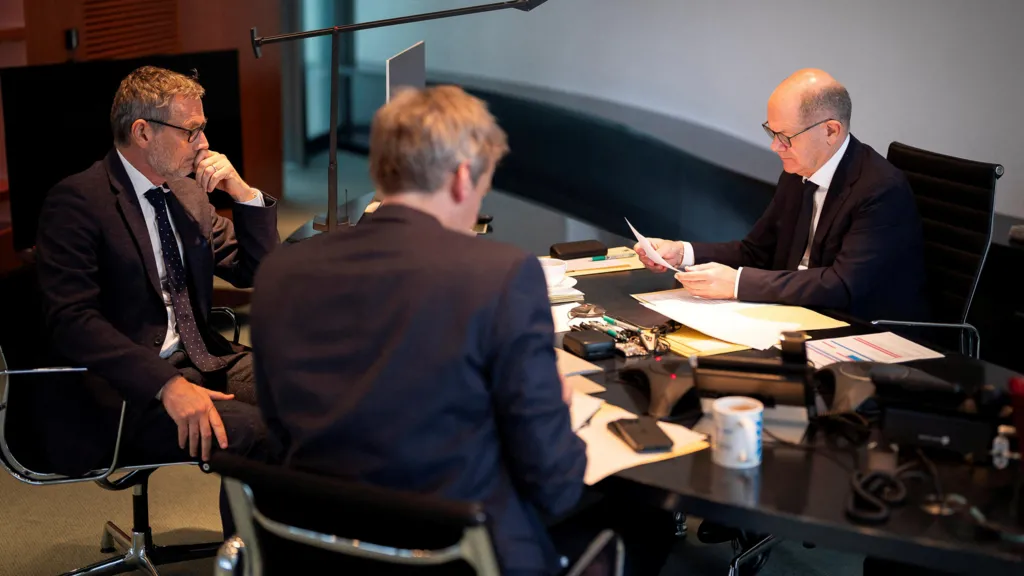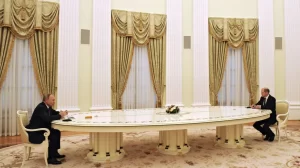North Korean troops in Ukraine ‘grave escalation’, Scholz tells Putin
4 min read
This was the first phone conversation between Scholz and Putin since December 2022. Steffen Kugler/BPA/Handout via Reuters

This was the first phone conversation between Scholz and Putin since December 2022. Steffen Kugler/BPA/Handout via Reuters
German Chancellor Olaf Scholz warned Russian President Vladimir Putin that the deployment of North Korean troops in Ukraine represents a “grave escalation” of the ongoing conflict. The two leaders held their first phone conversation in nearly two years on Friday, in which Scholz called for an immediate end to the war and the withdrawal of Russian forces from Ukraine. According to sources within the German government, Scholz also condemned Russia’s continued aggression, particularly its attacks on civilian infrastructure, and reiterated Germany’s unwavering support for Ukraine’s defense.
The Kremlin, meanwhile, described the exchange as a “detailed and frank” discussion on the situation in Ukraine, emphasizing that the mere fact of the dialogue was a positive development. However, Ukrainian President Volodymyr Zelensky labeled the call a “Pandora’s box,” expressing concerns that it could weaken the isolation of Putin and Russia on the global stage.
Scholz’s condemnation of Russia’s actions was firm. He called on Moscow to engage in negotiations with Kyiv to achieve a “fair and lasting peace,” while reiterating Germany’s commitment to supporting Ukraine for as long as necessary in its struggle against Russian aggression. The chancellor also expressed particular concern over Russia’s airstrikes on Ukrainian civilian infrastructure, which have been a key tactic in the war.
The call, which lasted about an hour, concluded with both leaders agreeing to stay in contact. Russian media reports indicated that the conversation was initiated by the German government, highlighting the ongoing diplomatic efforts from Berlin despite the political tension between Russia and Germany.
Germany has been cautious in its handling of the situation, particularly due to historical sensitivities in Eastern Europe regarding its past with Nazi Germany and the Soviet Union. Berlin is keen to avoid any perception that it might be negotiating with Moscow at the expense of Ukraine’s sovereignty. Prior to his conversation with Putin, Scholz spoke with President Zelensky to brief him on the call. Afterward, Scholz was expected to share the details of his conversation with Putin with Zelensky to maintain transparency.
In the Russian media statement following the call, Putin criticized the German government for what he called an “unfriendly course” that had led to an “unprecedented degradation” in Russian-German relations. He also indicated that any peace agreement with Ukraine must take into account the “new territorial realities” created by Russia’s occupation of Ukrainian land, which it claims as its own since the 2022 invasion.
Putin’s stance remains rooted in his long-standing narrative that NATO’s expansion into Eastern Europe is a major provocation, and he argued that the current crisis is a direct result of this policy. He suggested that any resolution to the war must address the “root causes” of the conflict, with an emphasis on Ukraine’s relationship with the Western military alliance.

Scholz had previously signaled his intention to engage with Putin and other world leaders to push for peace talks, noting that he was coordinating with international partners rather than acting unilaterally. Scholz is also expected to meet with Chinese President Xi Jinping at the upcoming G20 summit in Rio de Janeiro, where the war in Ukraine is likely to be a topic of discussion. China has expressed a more neutral stance on the conflict, maintaining ties with Russia while urging diplomatic solutions.
The conversation between Scholz and Putin marked the first direct communication since December 2022, and it occurred just a week before the full-scale invasion of Ukraine. At that time, Scholz had returned from a meeting with Putin in Moscow, where the Russian leader promised that Russia had no intention of invading Ukraine—an assurance that was shattered when Russian forces launched their attack days later.
The war in Ukraine has had profound consequences for Germany, which had long sought peace and stability through strong economic ties with Russia. The invasion, however, shattered that relationship overnight, leaving Germany as one of the leading supporters of Ukraine, second only to the United States in military and financial aid.
As Germany prepares for federal elections in February 2024, pressure is mounting on Chancellor Scholz to demonstrate progress toward a peace settlement. Although mainstream German political parties have consistently supported Ukraine’s defense, far-right and far-left factions, including the populist Alternative for Germany (AfD) and the newly formed BSW, have criticized the government for not doing enough to broker peace talks. These groups argue that Scholz’s approach risks prolonging the war and exacerbating economic and political instability.
The economic impact of the war on Germany has been significant, and with Scholz now leading a minority government after his coalition collapsed last week, the pressure to show progress on peace efforts is intensifying. As the election approaches, any sign that Scholz is taking steps toward ending the conflict could help restore his standing in the polls and improve his party’s prospects at the ballot box.